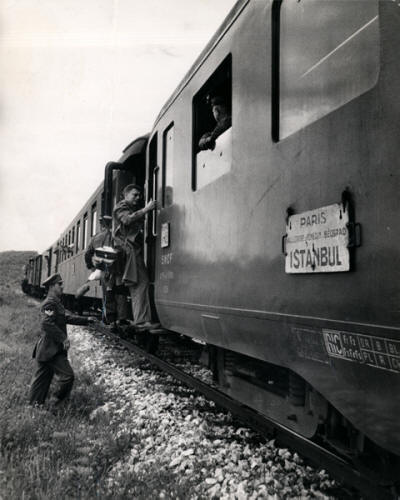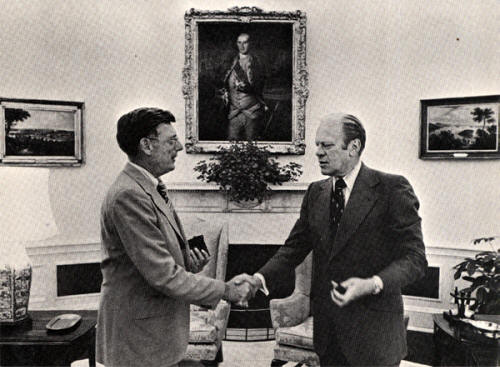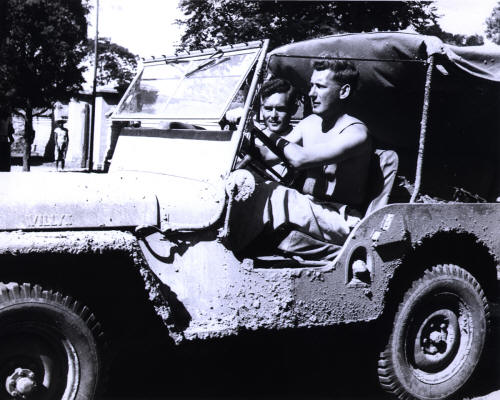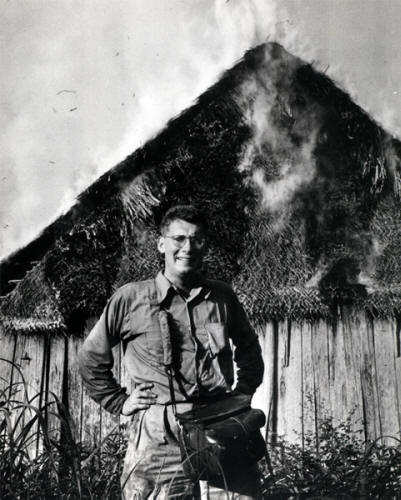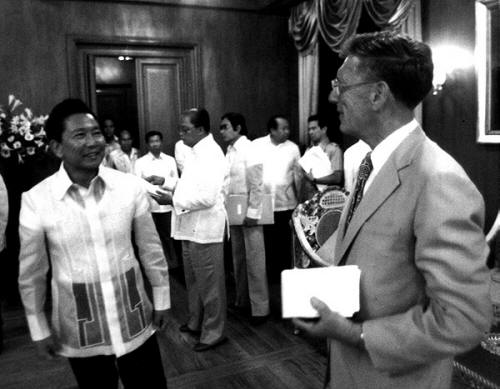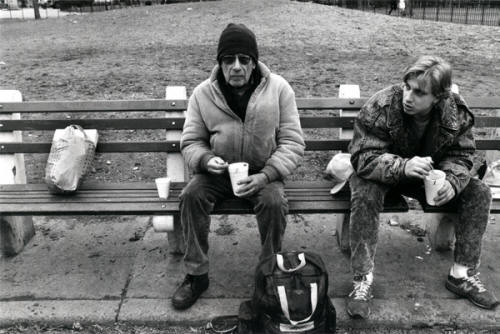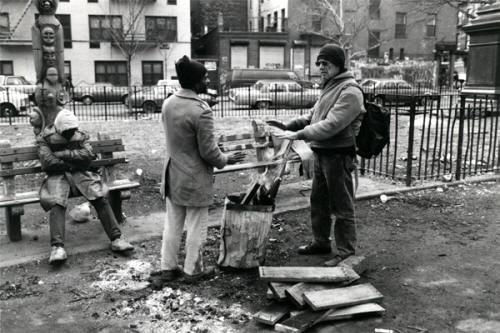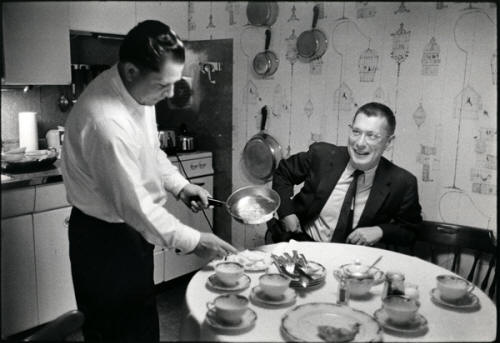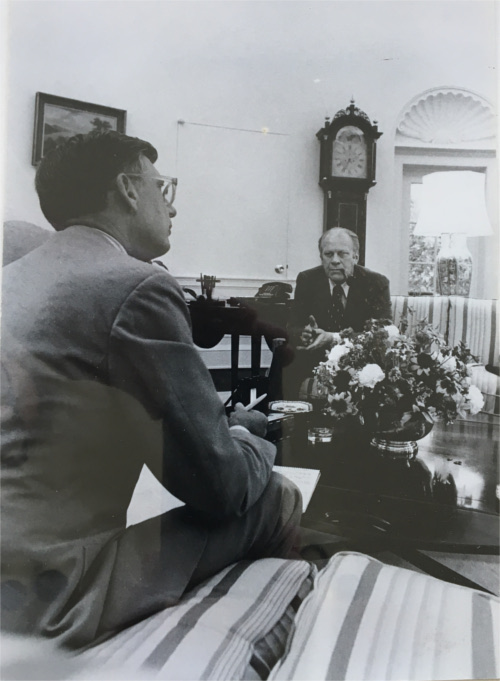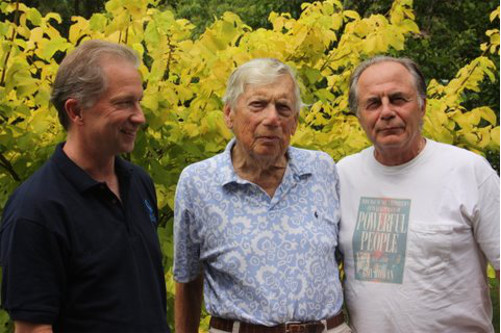By William J. Holstein
Roy Rowan, one of the most legendary foreign correspondents and authors of his era, succumbed to multiple physical conditions on Tuesday, Sept. 13, at the age of 96 at Greenwich Hospital in Greenwich, CT. He would have been 97 in February.
Rowan was president of the Overseas Press Club from 1998 to 2000 and was responsible for a large increase in the number of members because he wrote to every friend and acquaintance of his long career, imploring them to join. He also endowed the Rowan fellowship that year for the OPC Foundation and appeared at every subsequent foundation luncheon to welcome the recipient, no matter the physical challenges of making it to the Yale Club in midtown Manhattan.
Rowan started his career in the late 1940s after serving as a United Nations relief coordinator in China after World War II. His convoys were shot at so frequently that he decided to pack that career in and start another. He met the right Time-Life correspondent in a bar in Shanghai and got the job. The Columbia School of Journalism, however, rejected his application, as he was fond of remembering.
He covered the Chinese civil war and subsequently the Vietnam War, from his base in Hong Kong. His wife, Helen, whom he lured from her job in the Time-Life photographic department to marry him while he was posted in Germany, pre-deceased him. He leaves four sons. And he authored 10 books.
Larry Martz, another former OPC president, summed it up this way; “Roy will live forever in spirit, and certainly as long as the OPC can float. He did so much, knew so much and wrote so well, and he had friends everywhere. But he was always thoroughly unassuming and accessible, as unpretentious as his ratty old dinner jacket. We will miss him a lot.”
In lieu of flowers, the family has kindly requested that donations be made instead to the Overseas Press Club Foundation’s Roy Rowan Scholarship.
Donations can be mailed to 40 West 45th Street, New York, NY 10036 or call 201-493-9087 with credit card information.
Click here for a slide show of letters written to Roy Rowan from U.S. presidents and other notable figures during his career.
Below is a letter OPC member Roger Cohen wrote to his longtime friend Roy Rowan, which was read to him on the morning of the day he died.
Dear Roy,
I am writing to you from London, having just spoken to Marc. I want to tell you a few things. The first is that you have been the most wonderful friend to me over a quarter-century now. More than a friend, a role model and an inspiration. Your gesture in bringing me into the Century Club is a gift that keeps giving, just as you predicted it would. I have so many happy memories of meals there with you, of Block Island with the children, of you and Helen (and your always inspirational love for each other), of walking around New York with you, of parties and good times. Your zest for life always moved me, your ability to take the best out of everything and everyone, without compromise and with generosity; your love, simply, of beauty. I see you now casting a line into the morning surf at Block Island.
For me, and this is the second important thing I want to say, you also have represented everything a journalist and foreign correspondent should aspire to be. The word dispatch has become old-fashioned. But what you filed from China during the Civll War, from East Germany, from Hong Kong and from different datelines around the United States were dispatches – pieces of writing that brought places to life, explained them, showed the dilemmas of people living there, and transported readers into far-flung cities, villages, trenches and rice paddies. Technology has made us lazy. Journalists go out less often to find truth on the ground. You are a reminder that for all the changes over the past decades there is still no substitute for being there, seeing, absorbing, understanding. and bearing witness. I’ve always felt uplifted by your example, pushed to do better.
You have wanted to understand life by writing about it in many different forms. In this way you have passed along your wisdom to countless readers. What a gift that has been!
You are a fighter, Roy, You have the most indomitable spirit I have ever encountered. You have laughed and loved better than anyone I know. You have enfolded friends and family in an enduring embrace that has enriched their lives more than my poor words can say. I feel so lucky that an assignment all those years ago led me to you – and that I got to plunge deeply at that moment not only into a question of journalistic ethics that had affected you but also into discussions about the world that constituted the beginning of our rich friendship.
I am thinking of you all the time and send much love to you and all your family.
Roger
The following is a remembrance from OPC member Jordan Bonfante.
Roy Rowan was a man of many parts, as we know. In the course of a 50-year friendship, I got to know two of them especially well: There was Roy the tough-as-nails editor. And then much later, to my surprise, there was Roy the philosopher-poet. In my acquaintance, the rugged editor came first. As my boss on the old Life Magazine in the late ’60s, when he was an assistant managing editor for the front-of-the-book, he was as hard-nosed as anybody out of The Front Page. He went after stories straight and fast as a torpedo. He never beat around the bush. He rewarded a job well done, at times even lavishly. But he wasted none of his time – nor sentiment – on under-par performance.
I was the West Coast Bureau Chief based in Los Angeles, when at one point I was ordered to fire not just one, but two of our correspondents. After the deed was done, on the phone with Roy, I remember confiding that, in anticipation of having to swing the ax, I hadn’t been able to sleep the night before, not even a wink. “Don’t worry – it gets easier the more you do it,” said Roy, steadily. “Now, how are you planning to cover this Miranda story…?”
On another occasion I recall he assigned a photographer-correspondent team out of Hong Kong to a cover story about an insurrection in the Philippines. Desperate for a front-line cover pic, it seems the photographer talked the correspondent into dressing up as an armed guerrilla insurgent, prowling through the jungle with his back to the camera. Film and reporting duly arrived in New York. Printed in large format, select pictures appeared to be impressive. But, fatally, the photographer had bracketed too many times. And Roy, in his many years as a correspondent himself, had been in too many jungles and on too many front-lines to be fooled by a vulgar set-up. Poring over the contacts, it didn’t take him long to detect the hoax. Both staffers were recalled to New York forthwith and summarily dismissed. (The correspondent, I recall, somehow got himself a job on the night copy desk of Business Week. And for all I know, the photographer may have wound up covering school graduations in Allentown.)
Looking back, however, I suspect that Roy all the while may well have been a closet contemplative. For as the years went by- and as we rekindled our long friendship as fellow pensioners and neighbors in Greenwich, Conn. – I noticed that his transformation from man-of-action to poetic, even sentimental, deep-thinker was dramatic. He read up on Zen Buddhism. He and his adored wife Helen never missed a performance of their subscription to the Met Opera. The books changed. Chasing the Dragon, his first, had been about his adventures covering the Chinese civil war in the late ’40s. Now he wrote about his solitary reflections. “I see you’ve written a book about surf-fishing on Block Island,” I asked him. He said, “well, it’s actually about what you think about while you’re surf-casting at 4.30 in the morning.”
In 2011, at 90, he wrote Never Too Late, a thoughtful, upbeat treatise about the joys as well as the struggles involved with aging. I remember not long after that, I returned from a trip to Berlin with a token for the Rowans, a cd of Wagner’s Parsifal conducted by Claudio Abbado. They told me they listened to that Parsifal every evening before they went to bed. After Helen died in 2013, Roy wrote his last book, which was an ode to their lifelong love affair. And at that point, he told me one day, he could not bear to listen to Parsifal ever again on his own.
The letter below was written by OPC member Colin Leinster.
The first time I met Roy Rowan he was naked, standing in the door of his room at the Plaza. He invited me in and headed for the shower.
Let me back up a bit. This was in 1966 and I’d just quit my job at the New Orleans States-Item and was heading home to the UK. I was part owner of a sail boat and the plan was to have a last voyage and sell her, and then start looking for work – either in the U.K. or back in the U.S. The States-Item city editor, a LIFE stringer, suggested that I should try LIFE and helped me set up an interview. I had a number of them over a couple of days—with Marian MacPhail and Phil Kunhardt, among others — and made it to the top of the interview tree, Roy Rowan. As it happened, my visit coincided with LIFE’s annual Hunt Ball, named for George Hunt, the managing editor, and Roy’s only window was early evening at the Plaza wehere the festivities were being held. So our interview began in the bathroom, him lathering away and I, hot in my suit, sitting on a stool and answering his questions about my various newspaper experiences, in London, Cleveland, Riverside, California, and New Orleans. The next day I gave Marian MacPhail my contact numbers in the UK and headed back to England.
A couple of weeks later we were dropping anchor in the Channel Islands. Less than an hour later the lighthouse keeper arrived alongside in a rowboat with a telegram addressed to me. It was a job offer from Roy. How could anybody say no?
It wasn’t the last major boost he gave to my career. I started at LIFE that fall and, somewhat to my frustration found myself working as a fact checker. I was assigned to various stories (including, challengingly, one by Jimmy Breslin on the death of the Herald Tribune mainly written at Toot Shor’s watering hole). I’d been at LIFE less than six months when Roy beckoned me into his office. “How would you like to get out of here?” he asked. Where to? “The Saigon bureau,” he said. A few weeks later I was on my way.
I saw Roy only sporadically over the next few years. He’d moved on and so had I. But in the 1980s we bumped into each other at a book party. He was disappointed to hear I was working at BusinessWeek. He, in contrast, was at Fortune — a much better place for me, he said. Sure enough, he brokered my return to Time Inc. We’ve been in closer touch in the years since and I was always amazed at his energy. The last time I saw him at his home, and with ten books behind him, he was at work writing, and illustrating, poetry.
Thanks Roy, for everything.
Click on the link below to read a letter to Roy Rowan on the presentation of an honorary degree of Doctor of Humane Letters from the Trustees of Hartwick College in 1995.
Read Letter >>
Please read thoughts and remembrances of Roy Rowan from OPC members and other colleagues below.
“Roy and I served together on the OPC board of governors for nearly ten years before discovering we had homes on Block Island that were less than a quarter mile apart. My wife Dorothea became a regular contributor of her special German potato salad to the Rowans’ annual Fourth of July gathering overlooking the north end of the island. Roy was special and, as we all know, he did things for people, and he worked at staying active. I still remember him jogging on Corn Neck Road in his eighties. And he liked to tell how, when he went to buy a new car later on, he said to the salesman, ‘How many new cars have you sold to a ninety-year-old?’ And the salesman replied, ‘You’re the first.’ Roy Rowan was first – in a great many ways. We will miss him a lot.” – Larry Smith
“Roy was one of the first editors I met when I was lured away from the Chicago Sun-Times by Life in 1953, and he became my boss for years. And yet he was always so kind and helpful, he seemed more like a mentor than a boss. In the city room of the Sun-Times, the atmosphere was a little different. The reporter next to me kept a bottle of booze in his desk drawer and consulted it frequently. The city editor stood facing the city room, with one foot on his desk chair, staring out at us, hostile eyes roaming back and forth as if to ask which of you is going to screw up next. Roy was the antithesis. He explained every assignment carefully, offered advice, sometimes told stories from his own extraordinary career to forecast problems we might have and how he had solved them. Roy’s greatest contribution to my career? He taught me how to write short. Think about that. Anybody can write long, grinding on, word after word, graph after graph. It takes both talent and courage to write short. By example, by editing, by encouragement, Roy made sure I told the story fully, interestingly, briefly. It may have been the most important thing I ever learned from an editorial colleague. But that’s enough. I must write short about the wonderful man who taught me to do so.” – Dick Stolley.
“Roy was — and is — a legend.” – Marcus Mabry
“What was amazing about Roy was that he never lost his interest in the world around him, or his capacity to write about it. His topics ranged from war and public policy to dogs in the White House, which I think he wrote a book about when he was around 90. He was an inspiration to everyone who ever parachuted into a foreign conflict, and will be honored by his hundreds of friends and former colleagues around the world.” – Michael Serrill
“Roy will live forever in spirit, and certainly as long as the OPC can float. He did so much, knew so much and wrote so well, and he had friends everywhere. But he was always thoroughly unassuming and accessible, as unpretentious as his ratty old dinner jacket. We will miss him a lot.” – Larry Martz
“Roy Rowan was the epitome of the perfect gentleman and the humble highly skilled storyteller. Knowing him was a privilege and a pleasure. What a lovely man! He was a pillar of the OPC and a beacon of integrity who was generous in every sense of the word. We shall all miss his warmth, grace, humor and guidance.” – Allan Dodds Frank
“Roy Rowan was an elegant, sophisticated and international gentleman with compassion for his profession, journalism. His graceful writing style had a refined rhythm which made it so easy for readers to fall in love with his stories. Among my favorite is Roy’s book Solomon Starbuck Striper: A Fish Story About Following Your Dreams. This book warms our hearts and reminds the reader to seek a higher purpose in life. It seems that Roy was living and writing with this vision, a path shaped by beauty and hope. What an inspiration.” – Cornelia Heins
“Roy was a very good friend for about 45 years and a very useful friend too. He pushed me into the OPC and then suggested things I should do there. He pushed me into the Dutch Treat Club and then got me to put out its yearbook. He put me in touch with agents when I was writing books. Once a year or so he would take me up to his place on Block Island and get me out of bed at an ungodly hour to go surfcasting for bluefish and striped bass. After fishing, he would expect a huge breakfast at Bethany’s Airport Diner. In the evenings, there would be friends, drinks, dinner and stories. We would be up the next day before dawn and even when he was begin to have difficulties walking he would slog through the soft sand to get to the beach where he could cast. I remember one cold, windy fall morning I was all wrapped up with a warm jacket, hat and gloves and there was Roy, ten years older than me, in a light jacket, no hat, no gloves, happy and totally focused on fishing. I don’t know what the last 45 years would have been like without Roy.” – Jeremy Main
“Roy believed so much in nurturing young journalists that he started his own scholarship fund for the OPC Foundation. The idea was so supported by family and friends that it soon grew to be the Foundation’s most successfully endowed fund. Every year I enjoyed working with Roy on getting to know his chosen winner better. Even when his health was failing, he never missed a Foundation Scholar Awards luncheon. He was a star with a light touch who never missed an opportunity to show his appreciation. I will miss him greatly.” – Jane Reilly
“Roy was a Renaissance man: a superb journalist and author with wide-ranging interests. But more than that, he was one of the most thoughtful people I have ever met, kind and caring to friends old and new. He stayed engaged with the world to the very end. I and all your friends at the OPC will miss you Roy.” – Patricia Kranz
“At 96 years old Roy had stories for days, if you knew to ask for them. In a crowded Manhattan cocktail party he could keep a circle of eager young journalists and old hands leaning in to catch every detail. And despite all that accomplishment and experience, he was kind. One of the most interesting fellow scribblers I’ve been fortunate enough to meet, an asset to the club and an inspiration to a generation. I’m sorry to see him go.” – Charles Graeber
“A few years back, Roy spoke to me about age and how to enjoy it. Roy was a prince and an icon. Sadness is not what we’ll remember.” – Jacqueline Albert-Simon
“Roy Rowan was my 1st boss when I graduated from college. We worked together at LIFE for five years then two years at On the Sound Magazine as well as co-authoring the book, First Dogs: American Presidents and Their Best Friends. Roy was my mentor and dear friend for five decades and throughout he shared his family’s generosity and joy with me as he did with so many. A man who lived life deeply and positively with brilliance and commitment, courage and humor, he sought truth along with unusual and memorable stories during his long journalism career. All that Roy was in this earthly life is beautifully perpetuated in the “Roy Rowan Scholarship” offering young journalists a splendid opportunity and challenge to “follow the fellow who follows the dream.” Roy Rowan’s spirit lives on!” – Brooke Janis
“Roy came to our small (pop. 6,000) town in Iowa for a week in 1989 to write a story for TIME about how our town tried to heal from a devastating mass murder/suicide which took the lives of seven prominent Algona citizens. We loved him, and I think he loved us! He and I continued our friendship, long-distance, for many years thereafter.” – Molly MacDonald
“Roy Rowan was a gracious and generous friend, and towered as a journalist. He was able not only to tell the important stories of our time but to also make a story of his full, exciting, and fulfilling life. His accomplishments are an inspiration for all of us who put pen to paper. His glamour, true grit, and good humor will be sorely missed.” – Anne W. Semmes
Click on the window below to watch William J. Holstein’s three-part interview with Roy Rowan.



